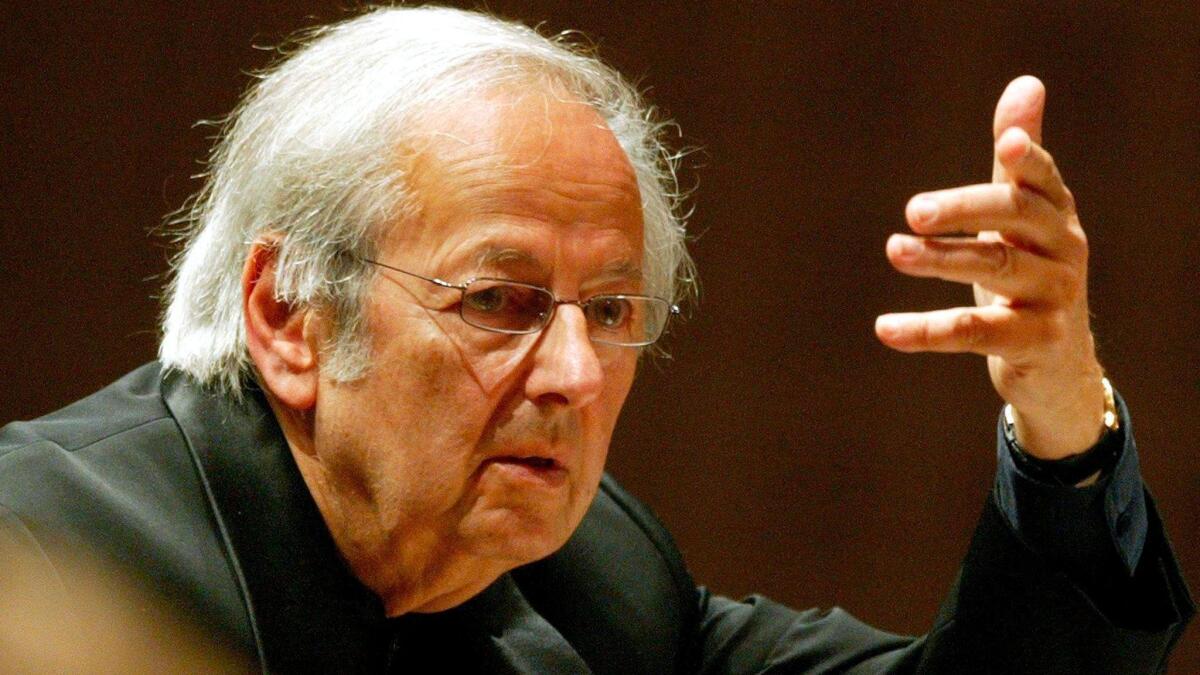Why André Previn left L.A. and wouldn’t set foot in the city for decades
- Share via
When André Previn died Thursday, tributes may have poured forth recalling his remarkable life as an internationally renowned orchestra conductor and four-time Academy Award-winning composer, but one detail in his obituary no doubt raised a question for many: Why, exactly, in the 1990s did Previn vow never to step foot in Los Angeles again?
The events surrounding Previn’s resignation as music director of the Los Angeles Philharmonic in 1989 proved so troubling for the conductor that he, indeed, did not enter city limits for decades, refusing to even change planes at LAX.
OBITUARY: André Previn, former L.A. Phil music director and celebrated composer, dies at 89 »
Long-brewing trouble came to a head in summer 1988, when the L.A. Phil’s notoriously gruff executive director, Ernest Fleischmann, announced that a young Finnish conductor named Esa-Pekka Salonen would become the orchestra’s principal guest conductor.
According to Previn, Fleischmann never consulted Previn about the appointment. That fact so rankled Previn that he managed to kibosh the deal, and the offer to Salonen was rescinded.
Previn couldn’t forgive Fleischmann for what he viewed as an overstepping of bounds, and the already sour relationship between the two men began to curdle. The Times’ music critic at the time, Martin Bernheimer, laid out his central hypothesis behind Previn’s resignation in an April 26, 1989, piece that had the headline “Previn Wanted to Run the Philharmonic — So Does Fleischmann.”
Unlike two former L.A. Phil music directors, Zubin Mehta and Carlo Maria Giulini, Previn was extremely hands-on in the day-to-day running of the orchestra, Bernheimer wrote. Fleischmann had become accustomed to shaping the trajectory of the L.A. Phil and had a hard time handing over the reins to Previn, especially when the latter’s personal taste seemed to attract a smaller audience.
“His problem was simple,” Bernheimer wrote of Previn. “He seldom excited the crowd at the Dorothy Chandler Pavilion. The crowd, moreover, was often small when he was in charge.
“Kurt Sanderling, a beloved old-school guest, attracted full houses and won standing ovations for his interpretations of the Germanic romantics. Young Esa-Pekka Salonen stirred the masses in more gregarious challenges. Meanwhile, Previn was in danger of becoming good old reliable Andre.
“Fleischmann, hardly a self-effacing, behind-the-scenes operator, obviously found this a difficult situation to accept. He is aggressive, demanding, autocratic, egocentric and, under the right circumstances, very good at his job. A clash was inevitable.”
That clash spilled into public view with Previn’s curt letter of resignation from his $500,000-a-year-plus position, which stated: “I have decided that, in the current structure of the Los Angeles Philharmonic, it has become obvious to me there is no room for a music director.”

THE LAST INTERVIEW: Previn’s last major interview with The Times »
Previn packed up his West Los Angeles home and moved to Bedford, N.Y., where he threw himself into work: a conductor laureate position with the London Symphony Orchestra, a chamber music series at Lincoln Center and an East Coast tour with the Dresden orchestra.
Dates in Los Angeles were noticeably absent from his calendar. The first reference in The Times’ archives of Previn’s hesitance to return to Los Angeles came in a 1992 interview that Bernheimer conducted in Previn’s Bedford home. Salonen had been named music director, a post he would hold until 2009.
“No, no, no. They’re not standing at the city limits with a gun,” Previn said of his inclination to become a prodigal son. “That was my choice. I didn’t feel like coming back during Esa-Pekka’s opening season, to be absolutely blunt about it. In fact, I was trying to be nice. I would not have enjoyed having Zubin around during my first season. I want to let Esa-Pekka do his thing.”
He then added: “I could never rule out a major city like Los Angeles.”
But he did, telling current Times music critic Mark Swed in 2015 an anecdote about changing planes in Orange County to avoid LAX. The year before, Previn even declined to visit L.A. for the Los Angeles opening of his opera “A Streetcar Named Desire,” mentioning in an interview that two decades had passed since he was last in the city.
Time healed some wounds. Previn eventually accepted a commission for the L.A. Phil’s centennial celebration. His work was scheduled to be performed in October, but representatives for the orchestra said Thursday they didn’t yet know the status of the composition.
Previn may have forgiven the L.A. Phil, but he appeared not to have forgiven Fleischmann.
“I have, by now, a lunatic hatred of Ernest Fleischmann,” he said in a 2017 interview with Tim Page for the book “Past/Forward: The LA Phil at 100.” “I don’t want to talk about that because it’s over, and he couldn’t help being the way he was.”
More to Read
The biggest entertainment stories
Get our big stories about Hollywood, film, television, music, arts, culture and more right in your inbox as soon as they publish.
You may occasionally receive promotional content from the Los Angeles Times.











